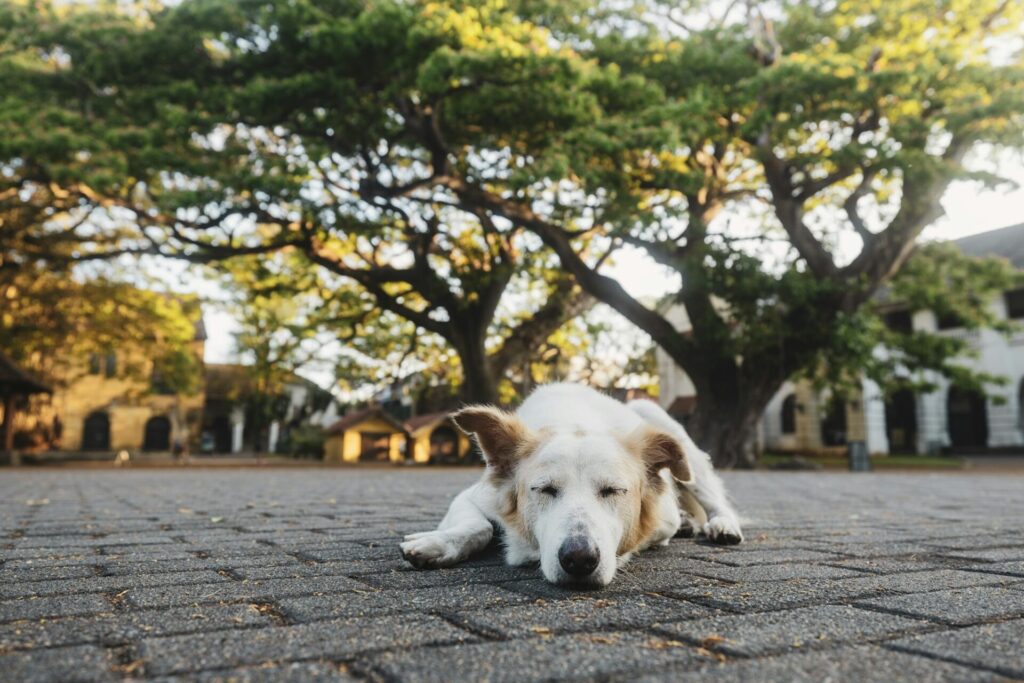Sri Lanka, the shining "Pearl of the Indian Ocean", is known for its tropical landscapes, sparkling white beaches and lively markets where exotic aromas tantalize the senses. But beneath the colorful surface, there is another side that surprises many visitors at first: street dogs that roam the villages and towns and are usually left to their own devices. These animals are part of the cityscape, but often also a reflection of the country's challenges.
The Dog Care Clinic, a unique initiative on the south coast of Sri Lanka, is committed to improving the lives of these street dogs. It is more than just a clinic: it is a place where sick, injured and abandoned dogs not only find medical help, but also receive care and protection. Founded with a clear mission, the Dog Care Clinic is committed not only to the welfare of the animals, but also to the harmonious coexistence of humans and animals.
In this article, we take a look behind the scenes of this special clinic. Find out what challenges it overcomes, what programs it offers and how each individual can contribute to sustainably improving the lives of dogs and people in Sri Lanka.
Background and problem definition
Sri Lanka has an impressive street dog population that has grown steadily over the last few decades. While dogs are considered family members in many parts of the world, they have a different status in Sri Lanka. Due to a lack of neutering programs and education, the dog population has been growing uncontrollably for years. The lives of these street dogs are often hard: they fight hunger and disease on a daily basis and often have to endure injuries and abuse. Skin infections, parasite infestations and, particularly dangerous, rabies are widespread diseases that threaten not only the dogs but also the population.
For people in Sri Lanka, especially in rural areas, dealing with sick or aggressive dogs is often a challenge. Rabies remains a serious health risk and there are frequent bite incidents that can end fatally without immediate medical assistance. The street dog situation also has an impact on tourism, one of the country's most important sources of income. For many visitors, the sight of sick and injured animals on the streets is disturbing and spoils the vacation experience.
This situation is deeply rooted in Sri Lankan culture, where animal welfare has not been given the same importance as in Western countries. The Dog Care Clinic is committed to raising awareness of animal welfare and improving the lives of dogs and humans alike through educational programs and medical care.
Foundation and history of the Dog Care Clinic
The Dog Care Clinic was founded on the initiative of Marina Möbius, who could no longer ignore the suffering of Sri Lanka's street dogs. In 2007, she founded the clinic in the southern coastal town of Hikkaduwa with the aim of offering sick and injured dogs a place to go that goes far beyond basic care. What began as a small, personal project quickly developed into one of the most important animal welfare centers in the country. From the very beginning, the clinic's mission was clear: they wanted to help the dogs and at the same time raise awareness of animal welfare among the local population.
Over the years, Marina Möbius and her team have treated, vaccinated and neutered thousands of dogs. But the Dog Care Clinic is not just about providing medical care for the dogs. Its aim is to create long-term solutions to the problem of street dogs and to bring about lasting change through education and awareness-raising. The clinic has gained prominence in the local community and has even been recognized by national and international organizations for its achievements in animal welfare.
A look at their life-saving programs and offerings
The Dog Care Clinic offers a wide range of services that go far beyond the usual care of a veterinary clinic. The clinic sees itself as a comprehensive center that caters to the needs of dogs and the community alike.
Medical care
Medical care is the heart of the clinic. Here, the dogs are not only routinely vaccinated and dewormed, but also receive intensive medical care. Many of the dogs arrive at the clinic in a very poor condition and require immediate treatment. Vets treat injured and sick animals, carry out surgical procedures and provide special care for dogs that are seriously ill. Dogs with special needs are hospitalized and stay until they are fully recovered.
Castration and sterilization programs
A central concern of the clinic is to contain the dog population through systematic castration and sterilization programmes. The clinic not only carries out these procedures on its premises, but also sends mobile teams to the surrounding villages to castrate and vaccinate dogs on site. These measures curb the uncontrolled growth of the street dog population, which leads to an improvement in living conditions for dogs and people in the long term.
Rescue and rehabilitation work
In addition to providing medical care, the clinic is also involved in the rescue and rehabilitation of seriously injured and abused dogs. The team is often on duty around the clock to rescue animals in distress. Rescued dogs that have been through particularly traumatic experiences are given special care and time to recover. The clinic prepares the animals to live in a safe environment and offers them the chance of a new life in a loving environment.
Adoption programs
Adoption programs are another important part of the Dog Care Clinic's work. Dogs that are healthy and socialized are placed with responsible new owners - both locally and internationally. The clinic ensures that the dogs find a loving home and supports the adoptive families with questions and challenges. In this way, the clinic not only gives the animals a new chance, but also relieves pressure on the street population and promotes understanding of animal welfare in the community.
Educational and awareness-raising work
The Dog Care Clinic relies heavily on education and awareness programs to bring about lasting change in the way animals are treated. It organizes workshops and events for the local population to raise awareness of animal welfare. Cooperation with schools is particularly important: children learn early on how to treat dogs respectfully and responsibly. The aim of this educational work is to raise a new generation of people who show compassion and responsibility in dealing with animals.
Impact on the community and society
The work of the Dog Care Clinic has far-reaching positive effects on the community. The vaccinations and castrations significantly reduce the risk of diseases such as rabies, which improves public health. This makes coexistence between humans and dogs safer and more harmonious.
In addition to the health benefits, the clinic's programs also promote a rethink in society. The educational work is creating a new understanding of animal welfare, and more and more people are recognizing the importance of treating animals with respect. The clinic also has positive economic effects: Tourism benefits from a friendlier, safer environment, and the clinic creates jobs and training opportunities for locals.
The neutering programs also contribute to the ecological balance, as a smaller dog population puts less pressure on the environment. The clinic is committed to sustainable operating practices and shows that animal welfare and environmental protection can go hand in hand.
Success and life stories
A particular highlight of the clinic are the success stories of the rescued dogs, which show how great the impact of the Dog Care Clinic is. Many animals that come to the clinic in poor condition are given a second chance and find a new home through the work of the clinic. Adoptive families repeatedly report on their positive experiences and how the dogs enrich their lives.
Some dogs that are not adopted due to their advanced age or serious injuries remain on the clinic grounds and are given permanent homes. These dogs, who get to know and appreciate the clinic as a "home", often have a therapeutic effect on other animals and help to make everyday life at the clinic more pleasant.
Challenges and obstacles
However, the Dog Care Clinic also faces considerable challenges. As a non-profit organization, it relies entirely on donations to finance its daily work. The costs for medication, surgical procedures and animal care are high, and funding is often scarce. There are also cultural and social hurdles: In Sri Lanka, the importance of animal welfare is not yet widespread and a lot of educational work is needed to break down prejudices.
Legal hurdles and environmental conditions also present the clinic with constant challenges. Bureaucratic obstacles and natural disasters such as flooding regularly challenge the team and require a high degree of flexibility and adaptability.
Opportunities to support the Dog Care Clinic
There are many ways for anyone who would like to support the work of the Dog Care Clinic: Donations help to cover the clinic's costs and implement necessary projects. If you would like to help on site, you can become a volunteer at the clinic and help care for the dogs. It is also possible to sponsor a specific dog and establish a personal connection with one of the rescued animals. Donations in kind such as food and medical supplies are also very welcome.
Future plans and projects of the clinic
The Dog Care Clinic is already planning further projects to increase its reach and improve the lives of street dogs in the long term. These include the expansion of the clinic and the introduction of mobile clinics that can also provide care in remote villages. In the long term, the clinic would like to establish Sri Lanka as a model project and share its successful approach in other countries.
The Dog Care Clinic shows what is possible when people work with passion and commitment for a good cause. With its programs and projects, it not only improves the lives of street dogs, but also the coexistence of people and animals in Sri Lanka. Every contribution - whether financial, through volunteering or sponsorship - helps to make this vision a reality.







